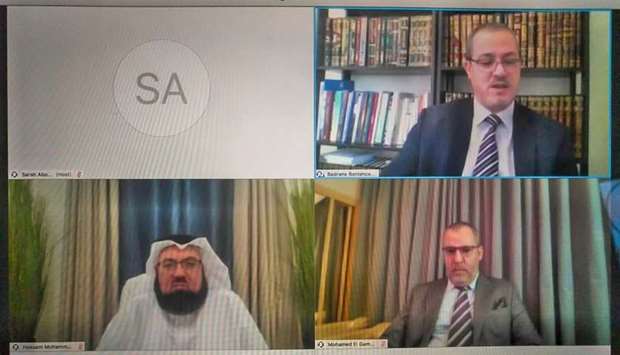The College of Islamic Studies (CIS), part of Hamad Bin Khalifa University (HBKU), organised a webinar on the Islamic approach to dealing with epidemics and how it affects worship.
The online event shed light on the parallels between Islamic guidelines over epidemics and the containment and quarantine measures being implemented to protect people from Covid-19, the respiratory disease is caused by the coronavirus.
The discussion was moderated by Dr Badrane Benlahcene, associate professor of comparative and philosophy of religions at the CIS.
Panellists referred to the theological dilemma arising from compliance with these measures, which prevent the normal expression of faith by drastically limiting religious gatherings as well as daily and Friday prayers in mosques.
Benlahcene, as director of Al-Qaradawi Centre for Islamic Reform and Renewal (QCIMR) at the CIS, said: “This webinar has shown us that Islam has specific guidelines in dealing with epidemics and that these align with the mandates being imposed by governments to prevent the spread of the novel coronavirus and help save lives.
“We hope that our discussion on this subject helped allay any misgivings about complying with safety mandates, particularly social distancing, and encourage people to avoid going out while we continue to contain the virus.”
The webinar explained the Islamic principles on epidemics, and its relevance to the coronavirus pandemic.
It also outlined the effect of these principles on worship and related aspects of Islamic faith that ensure Shariah objectives and the *fiqh of consequences are met during such crises.
Dr Hossam E Mohamed, senior researcher at the QCIMR and one of the panellists, said: “Until we ultimately contain this novel coronavirus, it is of utmost importance that we do everything we can to help prevent its spread in order to mitigate its impact on the health and lives of people.
“This webinar has shown us that, concerning Islamic beliefs, Shariah-based evidence and objectives confirm that we are treading the right path to ensuring that as many lives as possible are protected as we fight this pandemic.”
He was joined by Dr Mohamed El Gammal, associate professor of contemporary comparative *Fiqh at the CIS, who also questioned the dilemma on the mechanism of contemporary jurisprudence that addressed the coronavirus pandemic and its consistency with Maqasid Al-Shariah, considering the *fatwa on the closure of mosques.
In his speech, he emphasised numerous fundamental principles, such as institutional addressing of public matters, the legitimate licence that relates to the nation as it relates to individuals, and the necessity of dialogue to reduce disputes.
He concluded that the *fatwa of closing mosques is aligned with Maqasid Al-Shariah, as keeping oneself from death or harm is considered a necessity.
Prioritising the concept of safety is justified as praying collectively in the mosques is one of the complementary aspects of religion.
This *fatwa, indicating care and caution in order to avoid exposure to causes of harm, also leads to love of religion and appreciation of its moderation and rationality.
The discussion was moderated by Dr Badrane Benlahcene, associate professor of comparative and philosophy of religions at the CIS.
Panellists referred to the theological dilemma arising from compliance with these measures, which prevent the normal expression of faith by drastically limiting religious gatherings as well as daily and Friday prayers in mosques.
Benlahcene, as director of Al-Qaradawi Centre for Islamic Reform and Renewal (QCIMR) at the CIS, said: “This webinar has shown us that Islam has specific guidelines in dealing with epidemics and that these align with the mandates being imposed by governments to prevent the spread of the novel coronavirus and help save lives.
“We hope that our discussion on this subject helped allay any misgivings about complying with safety mandates, particularly social distancing, and encourage people to avoid going out while we continue to contain the virus.”
The webinar explained the Islamic principles on epidemics, and its relevance to the coronavirus pandemic.
It also outlined the effect of these principles on worship and related aspects of Islamic faith that ensure Shariah objectives and the *fiqh of consequences are met during such crises.
Dr Hossam E Mohamed, senior researcher at the QCIMR and one of the panellists, said: “Until we ultimately contain this novel coronavirus, it is of utmost importance that we do everything we can to help prevent its spread in order to mitigate its impact on the health and lives of people.
“This webinar has shown us that, concerning Islamic beliefs, Shariah-based evidence and objectives confirm that we are treading the right path to ensuring that as many lives as possible are protected as we fight this pandemic.”
He was joined by Dr Mohamed El Gammal, associate professor of contemporary comparative *Fiqh at the CIS, who also questioned the dilemma on the mechanism of contemporary jurisprudence that addressed the coronavirus pandemic and its consistency with Maqasid Al-Shariah, considering the *fatwa on the closure of mosques.
In his speech, he emphasised numerous fundamental principles, such as institutional addressing of public matters, the legitimate licence that relates to the nation as it relates to individuals, and the necessity of dialogue to reduce disputes.
He concluded that the *fatwa of closing mosques is aligned with Maqasid Al-Shariah, as keeping oneself from death or harm is considered a necessity.
Prioritising the concept of safety is justified as praying collectively in the mosques is one of the complementary aspects of religion.
This *fatwa, indicating care and caution in order to avoid exposure to causes of harm, also leads to love of religion and appreciation of its moderation and rationality.

